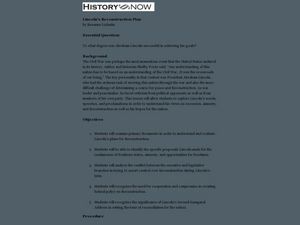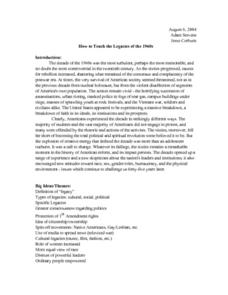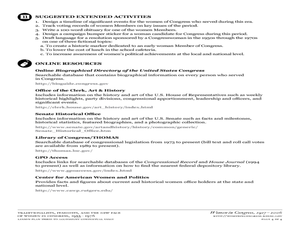Alabama Department of Archives and History
The Civil War at Home
To conclude a study of the 4 C's (cause, course, consequences, and characters) of the Civil War, young historians examine personal letters that reveal the effects of the war on those at home.
Curated OER
Lincoln and His Generals
Students explore Abraham Lincoln's role as Commander in Chief. In this American Civil War lesson, students listen to an instructor-delivered lecture on Lincoln's leadership and then analyze 8 pirmary documents to determine what Lincoln's...
Stanford University
Martin Luther King, Jr. and Malcolm X: A Common Solution?
Much has been made of the differences between Martin Luther King, Jr. and Malcolm X. But was there any common ground between them? Class members reconsider what they think they know about these two civil rights leaders with biographical...
Center for History Education
Continuity or Change? African Americans in World War II
While World War II was a pivotal moment in history, historians debate its importance to the civil rights movement. Class members consider the implications of segregation and the war using a series of documents and a jigsaw activity....
Curated OER
Abolitionists and Their Impact on Sectionalism
Eleventh graders examine the impact of Abolitionist leaders on sectionalism. In small groups, they conduct research on a famous abolitionist, and develop and write a newspaper cover page based on their assigned abolitionist.
US House of Representatives
Hispanic-American Members of Congress in the Civil Rights Era, 1945–1977
Debates around immigration in the news are not new, but they are a defining feature of the Hispanic American experience throughout the twentieth century. Looking through the lens of Hispanic Americans in Congress, class members explore...
Alabama Department of Archives and History
Cells for Sale - Convict Leasing in Alabama
The benefits and drawbacks of convict leasing following the Civil War are the focus of a lesson that asks groups to examine primary source materials to gain an understanding of the program before individuals decide whether they are in...
Curated OER
Election of 1864
An interesting lesson plan uses a hands-on-activity and group discussion to explore the 1864 presidential election and Lincoln's plans for ending the Civil War. Designed for high school, the resource also requires historians to...
Curated OER
Letters from the Japanese American Internment
Students examine letters of Japanese-American children during internment in World War II. They discover what it was like in the camps and how they were treated once they were released. They also view photographs of the camps.
Curated OER
American Justice on Trial
Students role play a trial in which they consider if the United States government violated the rights of Japanese Americans after Pearl Harbor.
Curated OER
Reconstruction
Students explain how the Civil War and Reconstruction both solved and created problems for our nation. They study how Reconstruction caused a further decline in relations between the North & South and how racism has been and is...
Curated OER
Uncle Tom's Cabin and American Culture
Young scholars examine and analyze primary sources. They analyze the causes and effects of major events of the Civil War. They explain a variety of antebellum notions of slavery. They understand the impact that Uncle Tom's Cabin had on...
National Endowment for the Humanities
Slavery and the American Founding: The "Inconsistency Not to Be Excused"
High schoolers examine slavery in the revolutionary and colonial eras of the United States. In this slavery lesson, students investigate the presence of slavery in early America, the language of the Constitution, and the intent of the...
Curated OER
Noncombatancy and the Seventh day Adventist Church
Upper graders investigate how the Seventh Day Adventists are objectors to the practice of war. The instructional activity covers the Civil War and examines the church's position about the practice of war. The research extends to modern...
University of California
Containing Communism Abroad
Learn more about the policy of the United States to contain communism during the Cold War. The fifth installment of an eight-part series looks at primary and secondary materials about a challenging time in history. After analyzing the...
PBS
The Meaning of the Fourteenth Amendment
The Fourteenth Amendment was extremely important to civil rights and is a crucial one to remember. The resource teaches about the Supreme Court decisions related to the amendment through writing exercises, reading, and working in small...
Curated OER
Lincoln's Reconstruction Plan
Students explore Lincoln's Reconstruction plan. In this Reconstruction lesson plan, students examine Lincoln's speeches and writings on bringing the country back together following the war.
University of Arkansas
Individuals Making a Difference
The focus of this, the third in a five-activity unit study of human rights, is on individuals who made a difference. Billy Bowlegs, Dr. Sun Yat Sen, Fannie Lou Hamer, Michi Weglyn, and Yuri Koshiyama are some of the people class members...
Historical Thinking Matters
Rosa Parks: 5 Day Lesson
What led to the success of the Montgomery Bus Boycott, and how might historians approach this question differently? This rich series of lessons includes a short introductory video clip, analysis of six primary source documents, and...
Curated OER
Abolishing Slavery
Students explain the goals and methods of the abolitionist movement.
They identify key leaders in the movement. This lesson has adaptations for elementary through high school. Links are provided for resource readings.
PBS
The Sixties: Dylan Plugs in and Sells Out
Before Woodstock, there was Newport. Get plugged in to the social changes of the 1960s with a activity that looks at Bob Dylan's performance at the 1965 Newport Folk Festival as a symbol of the radical changes that marked the era.
Curated OER
How to Teach the Legacies of the 1960s
Students consider which aspects of world around them have roots in 1960s, research and compare 1960s to today with regards to Civil and Women's Rights, Vietnam, counterculture, music, voting, and economic rights, and explore legacy of...
Curated OER
A Changing of the Guard: Traditionalists, Feminists, and the New Face of Women in Congress
Young scholars explore the role of women as Congressional leaders. In this women's rights instructional activity, students identify and investigate the impact of women representatives and senators in the U.S. Legislative Branch....
Curated OER
Reconsidering Malcolm X
Students analyze the strategies and speeches of Malcolm X and Martin Luther King, Jr.

























